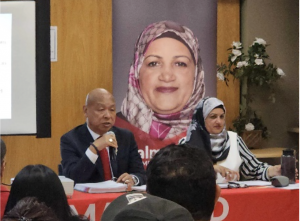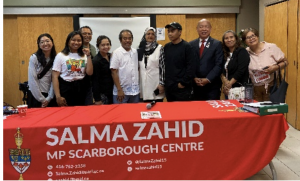On the permanent residency-on-arrival program for caregivers
On the permanent residency-on-arrival program for caregivers

MP Paul Chiang of Markham-Unionville, Parliamentary Secretary to the Minister of Immigration, Refugees and Citizenship, and MP Salma Zahid at Scarborough Centre host key discussion on New Caregiver Program
Community raises questions, concerns, issues
By Leny Rose Simbre
TORONTO – On June 25, 2024, MP Salma Zahid’s constituency office at Scarborough Centre hosted a successful roundtable discussion on the recently announced permanent residency-on-arrival program for caregivers. The event, held from 6 PM to 8 PM at the Dorset Park Community Hub, saw robust participation from a diverse group of stakeholders, including immigrant caregivers, care providers, representatives from the immigration consulting industry, migrant worker advocates, and newcomer settlement service providers. Joining the conversation were Mr. Paul Chiang, Member of Parliament for Markham-Unionville, and Parliamentary Secretary to the Minister of Immigration, Refugees and Citizenship.
This significant gathering aimed to address the community’s questions, hopes, and expectations regarding the new immigration program, unveiled by the Ministry of Immigration, Refugees and Citizenship Canada (IRCC) earlier in June. The program has generated significant interest and concern among caregivers and their advocates.
MP Salma Zahid opened the discussion by emphasizing the importance of inclusive and equitable immigration policies. “Our goal is to ensure that our immigration system is fair and just for all, including those who provide essential care in our society. Listening to the community’s perspectives is important in achieving this,” she stated.
Participants engaged in a lively and meaningful dialogue, focusing on several key issues. Attendees sought clarification on eligibility criteria and application processes for both current and prospective caregivers, emphasizing the need for clear guidelines to ensure that caregivers already in Canada could benefit from the new program. Concerns were raised about mechanisms to help caregivers maintain their legal status while transitioning to permanent residency, highlighting the precarious situation many face due to changing employment circumstances and expiring work permits.

Jhoey Dulaca of Migrant Workers Alliance for Change and Chris Sorio of Migrante Canada raise questions on the Newly Enhanced Caregiver Program
The necessity of job offers for caregivers already working in Canada was also debated. Many participants advocated for recognizing existing work experience as sufficient for permanent residency eligibility, eliminating the need for new job offers. Slow processing times and the annual cap on applications were significant concerns, with participants calling for expedited processing and an increase in immigration levels to accommodate more applicants.
The lack of clear guidelines on how caregivers can qualify for permanent residency upon arrival was another major issue. Attendees urged for transparent and straightforward processes to ensure smooth transitions. The exclusion of undocumented caregivers from the new pilot programs was a critical topic, with attendees advocating for pathways to permanent residency for undocumented caregivers, acknowledging their significant contributions to the caregiving sector.
Representatives from Migrante ON and other organizations, including The Neighbourhood Organization and the Migrant Workers Alliance for Change, attended the roundtable. They raised vital questions and sought clarifications on the newly released “enhanced” pilot program for caregivers. They also called for a halt to deportations until a clear pathway for regularization is established. While officials promised to do everything possible to regularize the status of current caregivers, they emphasized the need to continue pressuring other politicians to support a genuine regularization program.

Caregivers and representatives from other organizations who attended the roundtable discussion of MP Zahid
The roundtable featured testimonies from caregivers and care recipients’ family members, underscoring the program’s potential impact on their lives. The discussion concluded with a commitment to ongoing dialogue and collaboration to refine the program and address the concerns raised, particularly pushing for amnesty for caregivers and other migrant workers who lost their immigration status.
MP Salma Zahid expressed her gratitude for the active participation and insightful contributions. “Today’s discussion has been incredibly valuable. Your voices are essential in shaping policies that are just and effective. We will take your feedback to the Ministry to ensure that the new caregiver’s immigration program truly serves the needs of our community,” she said.
The successful roundtable marks a significant step forward in addressing the complexities and challenges faced by caregivers in Canada. It underscores the importance of community engagement and advocacy in shaping fair and equitable immigration policies.
Comments (0)